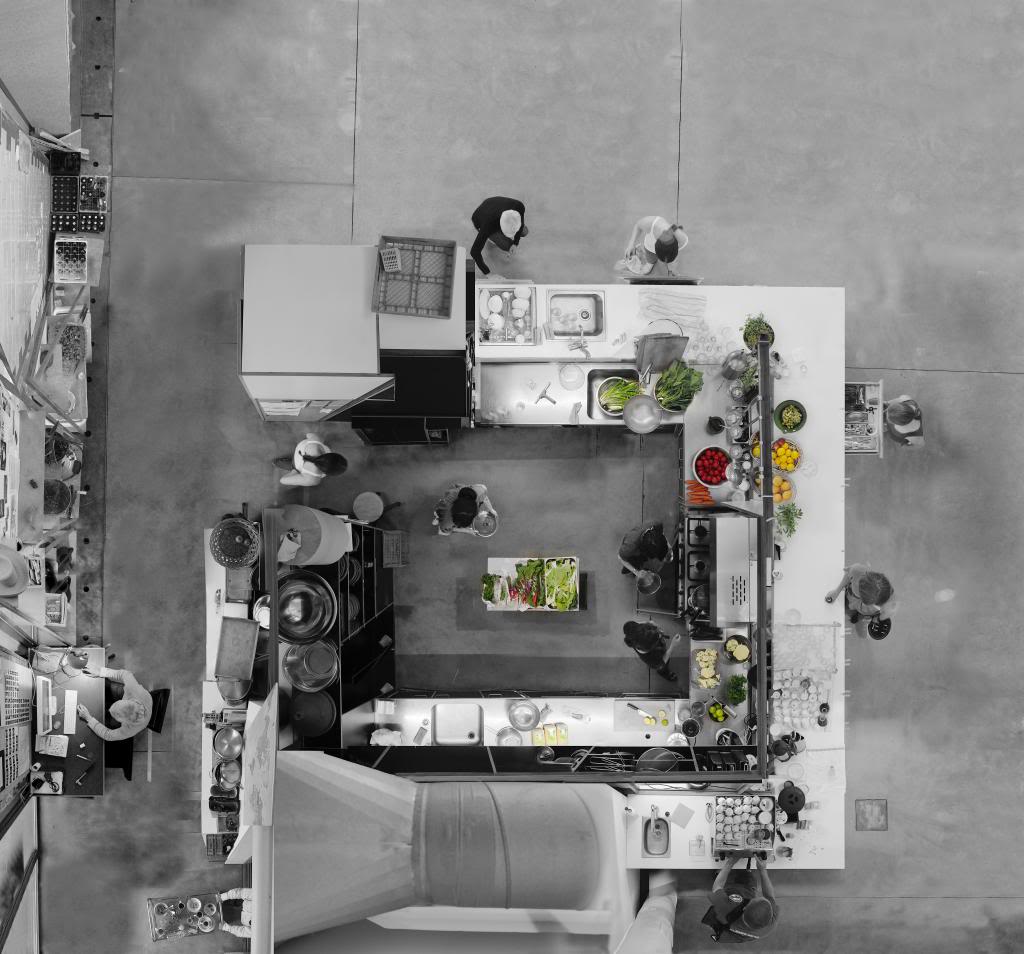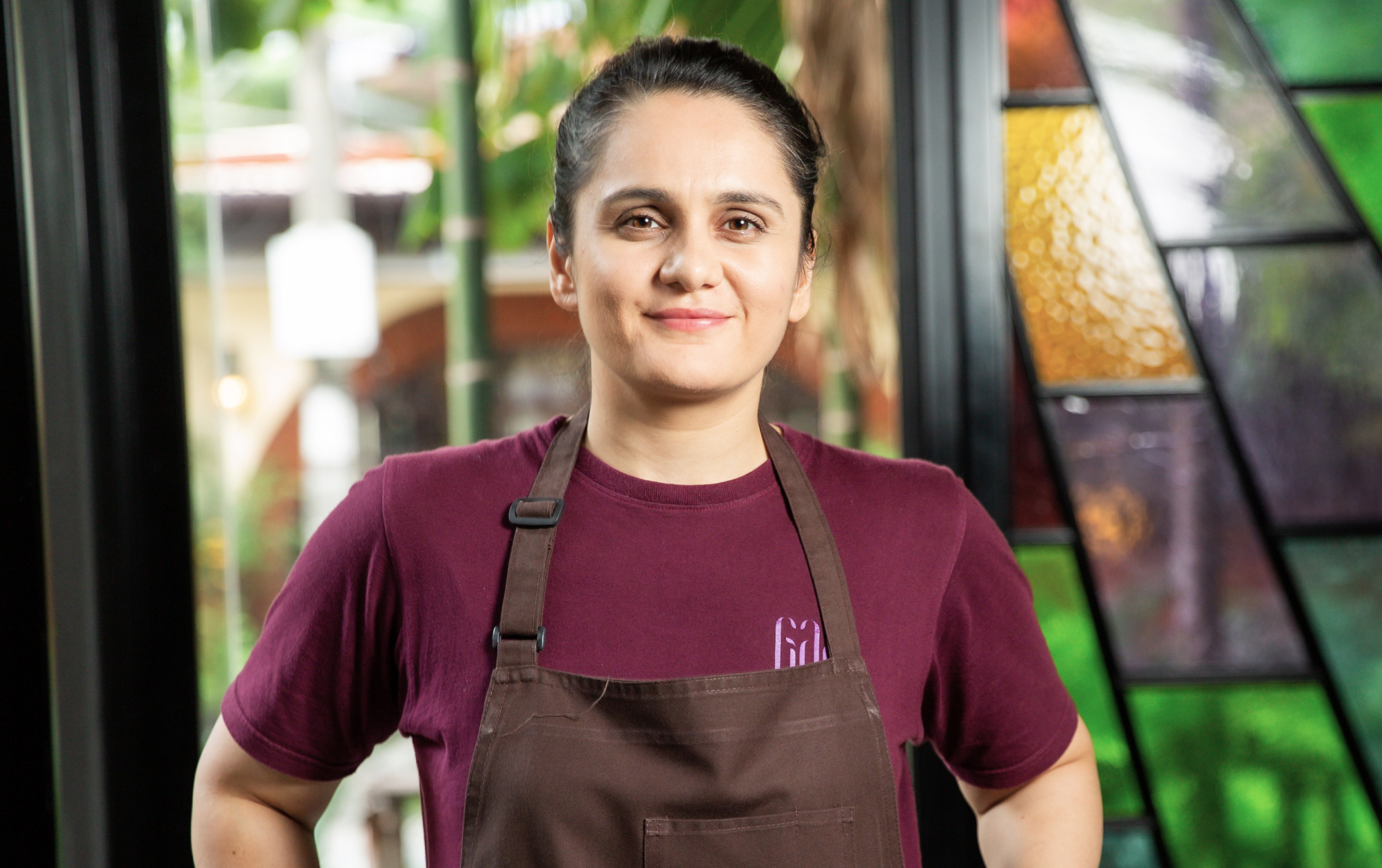A War Zone Cuisine
In 2013, Lucky Peach helped organize our MAD symposium under the theme of “GUTS”. The topics discussed during that two-day event—and later published in a Lucky Peach booklet called GUTS are still as relevant as ever. Every Wednesday until the GUTS run out, we’ll be publishing a feature from the collection. This week, Ahmed Jama discusses the power of food in a time of chaos.
I was born in Somalia, in an impoverished neighborhood called Howl-Wadaag, a district in Mogadishu. My mother was the single greatest inspiration of my life. She would bake muufo, a flatbread, and sell it to local restaurants. Our family struggled, certainly, but because of my mother’s hard work, my siblings and I were able to receive formal educations. Growing up, I remember helping my mother to deliver goatskins to faraway markets. They were heavy for an eleven-year-old kid like me. I was responsible not only for negotiating with buyers, but also for dealing with competitors in the market and the rowdy street kids. But the experience was ultimately enriching: it shaped my work ethic and inspired me to consider a career in hospitality.
In the early 1980s, I decided to leave Somalia for Central and East Africa, where I spent years as an assistant truck driver and, other times, selling gas and oil. The salaries weren’t much to live on, but I worked hard to save money. My goal was to make my way to Europe, particularly the UK, for better opportunities.
In the UK, I enrolled in culinary school, though the Somali community didn’t consider cooking a viable career. After graduating, I realized there was a niche in promoting Somali cuisine. I devised a business plan. My vision was to introduce Somali food to a wider audience, and to provide a way for my Somali community in the UK to enjoy food from home.
The richness of Somali culture and civilization lies in its great food. The initiative in London was an experiment on my part to change the negative perception toward our Somali community. I wanted to show that there’s much more to Somali culture than the negative depictions in the media. I’ve always believed in the ideals of Somali culture, and food is an integral part. I knew that with good food and hospitality, perceptions of Somalia could change.
My London restaurant was a success: non-Somali customers had great appreciation for Somali food. The success of the restaurant in London emboldened me to open restaurants elsewhere. Mogadishu, at the time, was not in my plan. But after seeing a number of countries, including UAE and Kenya,
I finally realized that there was an opportunity for me to open a decent restaurant in Mogadishu.
In 2008, when I opened the first modern restaurant in Mogadishu, it was during the peak of the insurgency war against the Transitional Somali Government. Violence was occurring on a daily basis. The responses from my friends and family were overwhelmingly of concern; they thought I was crazy to open a restaurant in a war-torn country. There were huge risks involved in the endeavor, I knew, but they were risks I felt I had to take. I wanted to introduce something unheard of to Mogadishu. I wanted to encourage people to dine out. I wanted to promote peace through good food, hospitality, and service. I wanted to provide an alternative to the war through great food and employment opportunities. Making profit was the least of my concerns. I had other motivations: to serve and unite my people around one of the most basic and powerful things in life—food. This was the real motivation behind my business. The Village became not just a new restaurant on the block, but a symbol of a new Somalia.
In fewer than two years, I’ve witnessed huge demands from customers who were fascinated by the professional setting and services of Village Restaurants. I have begun to expand services to include a holiday resort and hotel facility at Jazeera Beach, around twenty-five kilometers south of Mogadishu. The reactions, this time around, were more discouraging. People laughed at me and called the idea “a total insanity.”
When I completed the project, everyone wondered who would dare visit a desolated place so vulnerable to all kinds of attacks. Once again, the skeptics were proven wrong: the resort has since become a popular destination for returning Somalis and locals alike. Because of our large volume of customers, we could operate over capacity to accommodate for customers and VIP clients. Now, as a result of the restaurant, Jazeera Beach has undergone a transformation: from an empty beach to a densely crowded tourist destination.
The city has changed a lot, with businesses following in my footsteps and undertaking similar enterprises. It really inspires me every time I see a new business opening. I wanted to be a catalyst for peace, and having other businesses around serves well to that purpose of achieving a peaceful Somalia.
On September 20, 2012, I was attacked twice by double suicide bombers at two of my Village branches. I lost six of my ten staff and twenty-one customers. Despite the pain of loss of life and property damage, my spirit was unwavering to continue doing what I do. I had to reconstruct the entire restaurant. The restaurants have since reopened; they are operating and busy as usual.
A few months later, my restaurant was again attacked by double suicide bombers. Our brave security staff intercepted the bombers at the gate and prevented them from entering. This was the first attack of this nature at a private business in Somalia that was prevented successfully. But we still suffered some casualties and one fatality.
My business was a target for the terrorists because their objective was an antithesis of mine: I promote peace and they promote violence. I have endured other threats and setbacks, but my commitment to change the great city has prevailed each time.
Like mathematics, food is a universal language that bridges cultures and societies. It’s a tool, if deployed smartly, could change a society for the better. In London, my restaurant was a gateway for others to Somali culture. In Mogadishu, I used my restaurants to revive the city and provide employment opportunities to over 140 youths. I hosted Somalia’s Traditional Elders for over three months, who were fundamental in establishing a new democracy in Somalia—the first in forty years.
Food is not just food. It is more than that. Food is a mobile museum. Food is art. Food is a weapon. Food is peace. Food is fun. Food is employment. And most important, food is life. Amid all the pain, suffering, death, and destruction, Somalis see food as a unifying factor. This is what I hope to bring to my country today, as it recovers after twenty-four years of anarchy.




